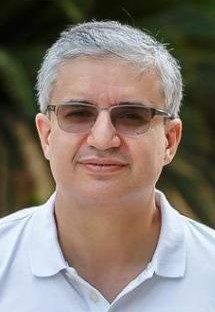Smart Villages: When Connectivity Meets Affordability
Seminar on Smart Villages given by the renowned distinguished IEEE Fellow: Professor Mohamed Slim Alouini.
Date and Time
Location
Hosts
Registration
-
 Add Event to Calendar
Add Event to Calendar
- Carleton University
- 1125 Colonel By Drive
- Ottawa, Ontario
- Canada K1S 5B6
- Building: Mackenzie Building
- Room Number: ME4463
- Click here for Map
- Contact Event Host
-
For more information, please contact Dr. Zied Bouida, IEEE YP Ottawa Chair and IoT Lab's Technical manager, bouidazied@ieee.org
- Co-sponsored by Carleton University’s Sensor Systems and IoT Lab
Speakers
 Mohamed-Slim Alouini of King Abdullah University of Science and Technology, Thuwal, Saudi Arabia
Mohamed-Slim Alouini of King Abdullah University of Science and Technology, Thuwal, Saudi Arabia
Smart Villages: When Connectivity Meets Affordability
The role of Internet and Communication Technology (ICT) in bringing about a revolution in almost all aspects of human life needs no introduction. It is indeed a well-known fact that the transmission of the information at a rapid pace has transformed all spheres of human life such as education, health, and economy to name a few. In addition, with the advent in Electronics and Photonics Technology (EPT), we have observed sustained growth and expansion in computation and display technology. From user demography perspective, urbanized population are the major beneficiary of such advances. Therefore, the benefits of ICT and EPT are yet to be experienced by almost 4 billion people in the world who are still “unconnected or under-connected” and suffer as such from the “digital divide,” a term coined in order to emphasize the lack of ICT infrastructure in many parts of the world.
Major challenges for widespread adoption of ICT and EPT in these areas are related to cost, lack of power supply, and complexities associated with learning and usage. However, if we can categorically overcome these challenges, then these technologies can be used for food, water, shelter, energy, environment, education, healthcare, and security. In addition, the wide-spread availability of these technologies will lead to smart suburbs, smart towns, smart villages, etc., without the need to necessarily live in smart cities. This would reverse the trend and allow a more sustainable world with a more balanced distribution of the population density. In this context, this talk will present recently proposed solutions to provide high-speed connectivity in rural areas along progress in affordable electronics to serve and contribute to the development of far-flung regions.
In particular, new solutions for both: (i) integrated satellite-airborne-ground networks providing global coverage and connectivity and (ii) terrestrial mesh/multi-hop directive networks connecting underserved areas will be discussed.
Moreover, some examples of democratized wearable electronics using Do-It-Yourself (DIY) assembly of paper along Android DIY applications capturing and displaying vital health signs over connected smartphones for real-time diagnosis will be presented.
Biography:
Dr. Alouini was born in Tunis, Tunisia. He received the Diplome d’Ingenieur from the École Nationale Supérieure des Télécommunications (TELECOM Paris Tech) and the Diplome d’Etudes Approfondies (D.E.A.) in Electronics with Highest Honors from the Université Pierre & Marie Curie in Paris, both in 1993. He received the M.S.E.E. degree from the Georgia Institute of Technology (Georgia Tech) in 1995, and a PhD in Electrical Engineering from California Institute of Technology (Caltech) in 1998. He also received the Habilitation degree from the Université Pierre & Marie Curie, Paris, France, in 2003.
Dr. Alouini served as a faculty member in the University of Minnesota, Minneapolis, MN, USA, then in the Texas A&M University at Qatar, Education City, Doha, Qatar before joining King Abdullah University of Science and Technology (KAUST), Thuwal, Makkah Province, Saudi Arabia as a Professor of Electrical Engineering in 2009. His current research interests include design and performance analysis of diversity combining techniques, MIMO techniques, multi-hop/cooperative communications systems, optical wireless communication systems, cognitive radio systems, and multi-resolution, hierarchical and adaptive modulation schemes.
Dr. Alouini has published several papers on the above subjects and he is the co-author of the textbook Digital Communication over Fading Channels published by Wiley Interscience. He has also won several awards in his career. For instance, he recently received the 2016 Recognition Award of the IEEE Communication Society Wireless Technical Committee, the 2016 Abdul Hameed Shoman Award for Arab Researchers in Engineering Sciences, and the Inaugural Organization of Islamic Cooperation (OIC) Science & Technology Achievement Award in Engineering Sciences in 2017.
Other recognitions include his election as Fellow of the (i) Institute of Electrical and Electronics Engineers (IEEE), (ii) Academy of Engineering & Technology of the Developing World (AETDEW), (iii) European Academy of Sciences and Arts (EASA) (Class VI: Technical & Environmental Sciences), and (iv) African Academy of Sciences (AAS). He is also IEEE Distinguished Lecturer for the IEEE Communication Society and IEEE Vehicular Technology Society, member for several times in the annual Thomson ISI Web of Knowledge list of Highly Cited Researchers as well as the Shanghai Ranking/Elsevier list of Most Cited Researchers, and a co-recipient of best paper awards in eleven IEEE conferences (including ICC, GLOBECOM, VTC, PIMRC, ISWCS, and DySPAN).
Email:
Agenda
* 1:00 PM to 1:45 PM: Presentation
* 1:45 PM to 2:00 PM: Questions and discussions
Event is Free. No registration is required. Refreshments will be provided.

